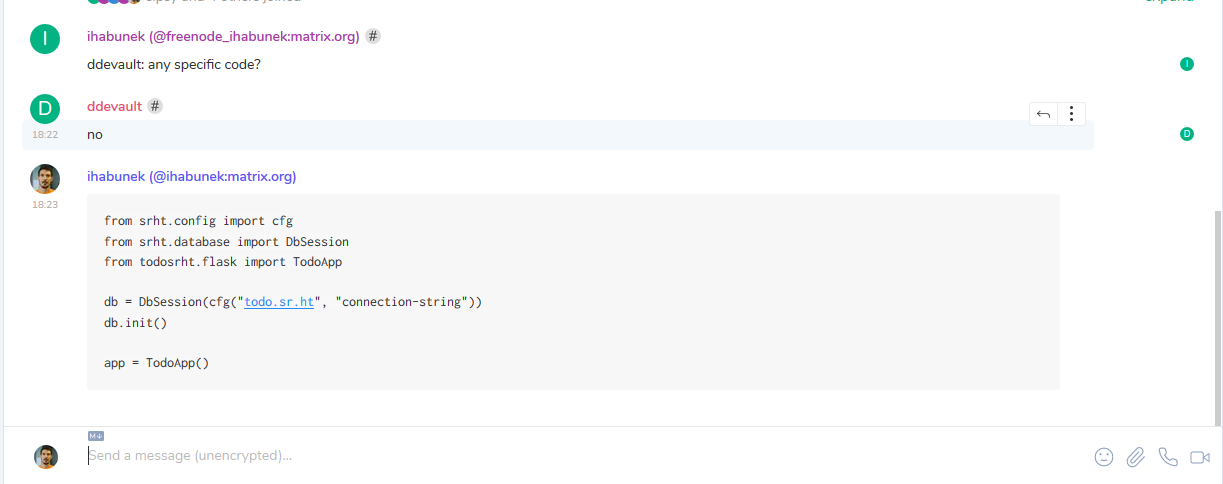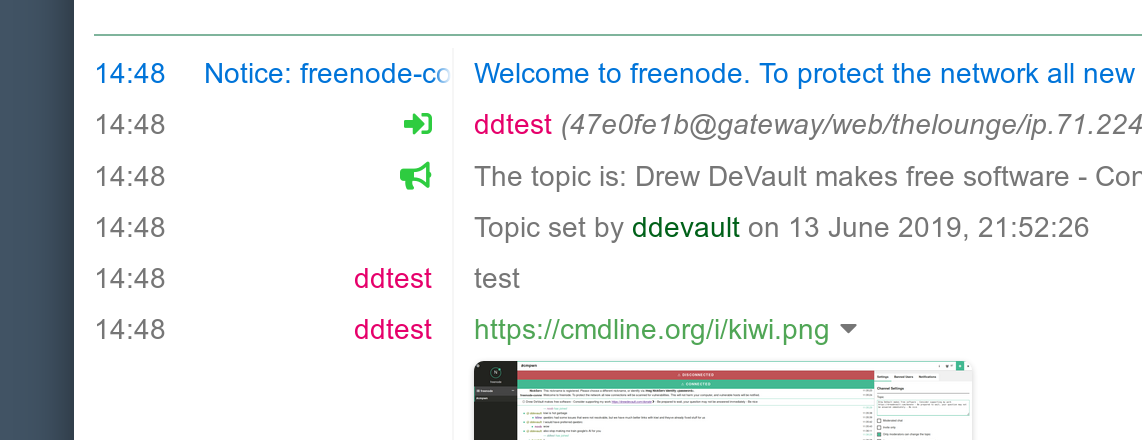The other day a friend of mine (an oper on Freenode) wanted to talk about IRC compared to its peers, such as Matrix, Slack, Discord, etc. The ensuing discussion deserves summarization here. In short: I’m glad that IRC doesn’t have the features that are “showstoppers” for people choosing other platforms, and I’m worried that attempts to bring these showstopping “features” to IRC will worsen the platform for the people who use it now.
On IRC, features like embedded images, a nice UX for messages longer than a few line (e.g. pasted code), threaded messages, etc; are absent. Some sort of “graceful degradation” to support mixed channels with clients which support these features and clients which don’t may be possible, but it still degrades the experience for many people. By instead making everyone work within the limitations of IRC, we establish a shared baseline, and expressing yourself within these limitations is not only possible but makes a better experience for everyone.
Remember that not everyone is like you. I regularly chat with people on ancient hardware that slows to a crawl when a web browser is running1, or people working from a niche operating system for which porting a graphical client is a herculean task, or people with accessibility concerns for whom the “one line of text per statement” fits nicely into their TTS2 system and screenreading Slack is a nightmare.
Let’s consider what happens when these features are added but non-uniformly available. Let’s use rich text as an example and examine the fallback implementation. Which of these is better?
(A) <user> check out [this website](https://example.org)
(B) <user> check out this website: https://example.org
Example B is what people naturally do when rich text is unavailable, and most clients will recognize it as a link and make it clickable anyway. But many clients cannot and will not display example A as a link, which makes it harder to read. Example A also makes phishing much easier.
Here’s another example: how about a nice UI for long messages, such as pasted code snippets? Let’s examine how three different clients would implement this: (1) a GUI client, (2) a TUI3 client, and (3) a client which refuses to implement it or is unmaintained4.
The first case is the happy path, we probably get a little scrollbox that the user can interact with their mouse. Let’s say Weechat takes up option 2, but how do they do that? Some terminal emulators have mouse support, so they could have a similar box, but since Weechat is primarily keyboard-driven (and some terminal emulators do not support mice!), a keyboard-based alternative will be necessary. Now we have to have some kind of command or keybinding for scrolling through the message, and picking which of the last few long messages we want to scroll through. This will have to be separate from scrolling through the backlog normally, of course. The third option is the worst: they just see a hundred lines pasted into their backlog, which is already highly scorned behavior on most IRC channels. Only the GUI users come away from this happy, and on IRC they’re in the minority.
Some IRC clients (Matrix) have this feature today, but most Matrix users don’t realize what a nuisance they’re being on the chat. Here’s what they see:

And here’s what I see:

Conservative improvements built on top of existing IRC norms, such as The Lounge, are much better. Most people post images on IRC as URLs, which clients can do a quick HEAD request against and embed if the mimetype is appropriate:

For most of these features, I think that people who have and think they need them are in fact unhappier for having them. What are some of the most common complaints from Slack users et al? “It’s distracting.” “It’s hard to keep up with what people said while I was away.” “Threads get too long and hard to understand.” Does any of this sound familiar? Most of these problems are caused by or exacerbated by features which are missing from IRC. It’s distracting because your colleagues are posting gifs all day. It’s hard to keep up with because the infinite backlog encourages a culture of catching up rather than setting the expectation that conversations are ephemeral5. Long conversations shouldn’t be organized into threads, but moved into email or another medium more suitable for that purpose.
None of this even considers what is good about IRC. It’s a series of decentralized networks built on the shoulders of volunteers. It’s venerable and well-supported with hundreds of client and server implementations. You can connect to IRC manually using telnet and have a pretty good user experience! Accordingly, a working IRC bot can be written in about 2 minutes. No one is trying to monetize you on IRC. It’s free, in both meanings, and nothing which has come since has presented a compelling alternative. I’ve used IRC all day, every day for over ten years, and that’s not even half of IRC’s lifetime. It’s outlived everything else by years and years, and it’s not going anywhere soon.
In summary, I like IRC the way it is. It has problems which we ought to address, but many people focus on the wrong problems. The culture that it fosters is good and worth preserving, even at the expense of the features users of other platforms demand - or those users themselves.
P.S. A friend pointed out that the migration of non-hackers away from IRC is like a reverse Eternal September, which sounds great 😉
-
Often, I am this person. ↩
-
Text to speech. ↩
-
Text user interface ↩
-
IRC is over 30 years old and has barely changed since - so using unmaintained or barely-maintained clients is not entirely uncommon nor wrong. ↩
-
Many people have bouncers which allow them to catch up the last few lines, and keep logs which they can reference later if necessary. This is nice to have but adds enough friction to keep the expectation that discussions are ephemeral, which has a positive effect on IRC culture. ↩
Have a comment on one of my posts? Start a discussion in my public inbox by sending an email to ~sircmpwn/public-inbox@lists.sr.ht [mailing list etiquette]
Articles from blogs I follow around the net
Next steps toward Go 2
We’re well on the way towards the release of Go 1.13, hopefully in early August of this year. This is the first release that will include concrete changes to the language (rather than just minor adjustments to the spec), after a longer moratorium on any such …
via The Go Programming Language Blog June 26, 2019Heap Allocation
This post adds support for heap allocation to our kernel. First, it gives an introduction to dynamic memory and shows how the borrow checker prevents common allocation errors. It then implements the basic allocation interface of Rust, creates a heap memor…
via Writing an OS in Rust June 26, 2019Status update, May 2019
This month is a little special: it’s been one whole year I’ve started writing status updates! My list of projects has been growing, little by little, and I now spend a pretty big slice of my “open-source contributions time” doing reviews. While this gives …
via emersion June 4, 2019Generated by openring